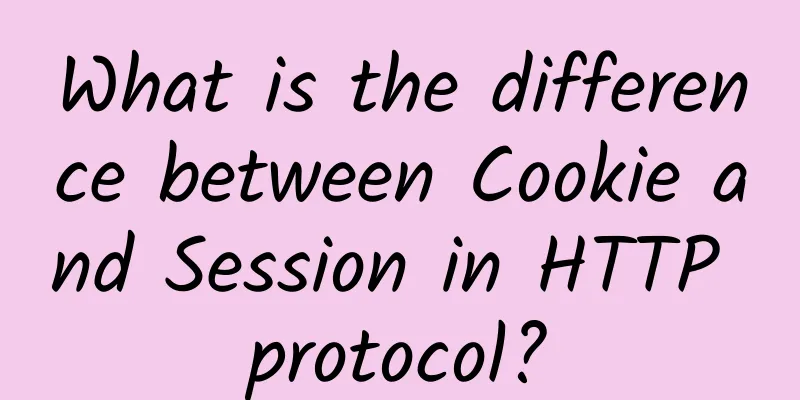What is the difference between Cookie and Session in HTTP protocol?

|
HTTP is a stateless protocol, that is, each time the server receives a request from the client, it is a new request, and the server does not know the client's historical request records. Cookies and Sessions are both session methods used to track the identity of browser users, in order to make up for the stateless nature of HTTP. A cookie is a small piece of data that a server sends to a user's browser and stores locally. It will be carried the next time the browser makes a request to the same server. Cookies store information about logged-in users, so that the next time you visit a website, the page can automatically fill in some basic login information. Usually, it is used to tell the server whether two requests come from the same browser, such as keeping the user logged in. In addition, cookies can also store user preferences, themes, and other settings. The function of Session is to record the user's status through the server. Generally, we use Cookie to manage Session. When the server receives the request for the first time, it generates a Session ID, sets the Session ID field through the Set-Cookie command in the response header, and sends a response to the client requesting the setting of Cookie. After the client receives the response, it saves a Cookie information containing the Session ID field on the local machine. Each time the client sends a request to the same server, the request header will carry a Cookie containing the Session ID, and then the server obtains the Session ID of this request by reading the Cookie in the request header. It should be noted that if the client has disabled cookies, the method of saving the Session ID through cookies will not work. In this case, we can also put the Session ID in the requested URL. Considering security, we can also encrypt the Session ID. Overall, there are five differences between Cookie and Session: 1. The storage locations are different. Cookie data is stored on the client browser, while Session data is stored on the server. 2. Different security. Cookies are stored on the local browser and can be forged to deceive cookies, so relatively speaking, Session is more secure. 3. The size of stored data is different. The data stored in a single cookie cannot exceed 4K. Many browsers limit a site to storing a maximum of 20 cookies. Session is stored on the server and the browser has no restrictions on it. 4. The data types are different. Cookies only support the storage of string data, while Session can store any data type. 5. The validity period is different. Cookies can be set to be kept for a long time, such as the automatic login function we often use. Sessions are generally effective for a short time and will become invalid when the client is closed or the Session times out. |
>>: Let's talk about HTTP/3, QUIC, how do they work?
Recommend
2024 Cybersecurity Service Application Status Survey: Service Quality and Effectiveness Are the Biggest Application Challenges
As cybersecurity threats continue to evolve and e...
Improving 4G resident ratio by adjusting RSRQ measurement parameters
Today, when mobile Internet 4G communication has ...
The number of users is not increasing, the time spent is declining, and 5G applications are delayed. Can we only wait for the flowers to bloom in 2021?
[[397144]] After many twists and turns, the numbe...
Analysis of the development pattern of domestic and foreign optical communication markets
1. Distribution of the global optical communicati...
Deploy Nginx Plus as API Gateway: Nginx
Learn how the famous Nginx server (an essential f...
Potential application scenarios of 6G in the future
Although 6G is not yet a viable technology, it wi...
How many people are using invalid 5G? The price has doubled, and the experience has become worse
It has been two years since the promotion of 5G b...
Let's talk about 3CC, which is very popular this year
The day before yesterday, I published an article ...
Clarity: Docker's four network modes
1. Closed container closed network mode It is equ...
HostYun: US CN2 GIA line KVM monthly payment starts from 12 yuan, South Korea CN2 line KVM monthly payment starts from 15.9 yuan
HostYun (Host Cloud) was formerly known as hostsh...
The number of 5G mobile phones will reach 250 million. Is this good news?
According to a new research report released by St...
25 years later, the CDMA legend ends
On June 12, South Korea's Ministry of Science...
Understand enterprise AAA authentication, authorization, billing services and configuration in one article
Hello everyone, I am Bernie, an IT pre-sales engi...
HostXen offers 50 yuan for new users, 50 yuan for old users who charge 300 yuan, and monthly payment for 6G memory package starts from 70 yuan
HostXen launched its first promotion after the Lu...
How to avoid safety traps when using mobile phones for the elderly? Remember these "iron rules"
With the development of mobile Internet, people o...








![[6.18] Hengchuang Technology Flash Sale: Hong Kong cloud server starts from 262 yuan/year, Hong Kong/US independent server starts from 800 yuan/month](/upload/images/67cac336252f9.webp)
